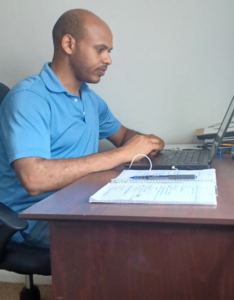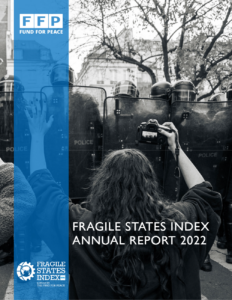“Chance favors only the prepared mind”
Louis Pasteur
From Yared: AFE at the Fund for Peace and beyond
My 12-year professional career in the field of Environment and Energy has shown me the important contribution of these fields in securing sustainable development and lasting peace for any community and/or nation. Based on this, my aspiration as a Rotary Peace Fellow is to leverage the opportunities these sectors offer to promote peace all around the world. For this purpose, in this era of data and technology, utilizing the high volume of data that are being generated daily from different sectors and activities is crucial and makes the effort fruitful and impactful.

I strongly believe that in almost everything we do, the power of having data and properly using it in every planning and decision-making process is becoming mandatory if we want to have evidence-based presentation of facts for policy makers, implementers, and the public at large. Recognizing this fact, I inclined my area of interest in integrating the exhaustive use of data in development interventions and, started to shape my knowledge and skills in the field of data analysis by taking different varieties of courses during my first-year study at Duke University. As the period for the Applied Field Experience (AFE) approached, my focus was to look for opportunities that resonate with my interest which is having a role in any organization that use data for promoting development and peace. Thanks to the continued support of the Duke-UNC Rotary Peace Center, I connected with the Fund for Peace (FFP), which I found to be the right place to practice and learn more on the use of data for peacebuilding.
The first big opportunity that I had while working at the FFP is to work and assist on the launch of the FFP Fragile States Index (FSI) 2022 report which covers the year 2021 (https://fragilestatesindex.org/2022/07/13/fragile-states-index-2022-annual-report/). The development of the Fragile States Index is one of the main tasks of FFP and is conducted on a yearly basis to inform the situation of each one of the 197 countries around the world. It portraits their respective vulnerability to fragility. For this, the Organization uses 12 conflict risk indicators each with an average of 13 parameters to measure the stability situation of a country in a specific period. Of these indicators, some are easier and much better elaborated using quantitative sources, while the others are defined using qualitative sources of information. In both cases, the Organization uses many different sources to gather information and data on those 12 identified indicators and their corresponding parameters to generate the Index.
In the 2022 FSI development process, I had the opportunity to participate in the expert discussion on the finalization of the FSI scores of around 20 countries (those worsening the most, and those which improved the most), which also gave me the opportunity to closely look at the development process of the FSI. The complexity of the data collection and consolidation process to produce the Index presented a conducive environment for me to challenge myself, practice and apply data analysis tools to improve the data collection process. This opportunity allowed me to take a closer look at and research the methodology used for developing the FSI so that I can learn more and apply the data analysis knowledge and skills that I obtained through different exposures (and contribute if there are areas for improvement).
From my observation during the discussion in the final sessions of the Fragile States Index expert review meeting, I proposed and suggested the partial if not full automation of the data collection process to calculate the FSI. I was pleased to receive approval from the CEO to discuss the matter further with the concerned Unit in the Organization. The main idea of the automation is not substituting the experts’ input but rather supporting their analysis by making the processed data ready for their review and validation, making the overall process more timely, less tedious, and allow experts to focus more on the qualitative review. For this purpose, I have researched and reviewed the methodology and the processes that FFP uses and selected one major indicator (which has 11 measurable parameters) out of the 12 indicators to test my proposal. I have identified the main data sources for the measurable parameters of the selected indicator and started to gather data. I am working on a methodology to develop a python pipeline to extract the data from the sources automatically. Although the proposed sample product is destined to be used for the Fund for Peace’s FSI preparation, the design process takes into consideration the replicability or applicability of the product in other development sectors as well.
My engagement with the Fund for Peace has also given me the chance to closely look at and learn more about the primary root causes, drivers, and consequences of instability in different countries around the world, in both developed and developing countries. Moreover, through the different tasks, assignments and group-work in the Organization, I have been able to form networks with other interns and staff there.

In addition to the AFP at the FFP in the summer, I have been working with a previous Rotary Peace Fellow to set up a startup business that will be engaged in the provision of AI and data analysis services to present data in a usable form for facilitating informed planning and decision-making. The business aims to assist developing countries and organizations working in development, conflict assessment, peacebuilding, among others. With the capacity I have in my previous career, working with small and medium enterprises, I have volunteered for setting-up the business and continued to consult in both the programmatic and administrative aspects of the business. Currently, I have continued to support the development of the business plan and business registration process at the NC Secretary of State.
I believe that the summer AFP and my volunteer engagement have given me the opportunity to broaden my area of expertise in the data analysis field and the ability to integrate it with international development and peacebuilding interventions. This in turn has opened a new professional path that will enable me to leverage my previous experience, past and present educational qualifications, and personal interests in the application of data science field for the promotion of sustainable peace and development.
I am thankful for the Trustees of The Rotary Foundation, Rotary International, Duke-UNC Rotary Peace Center and whole Rotary family for the continued and unreserved support in my professional journey to become a competent contributor for positive peace building process and sustainable development.